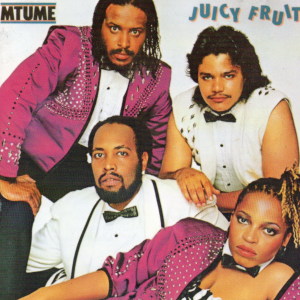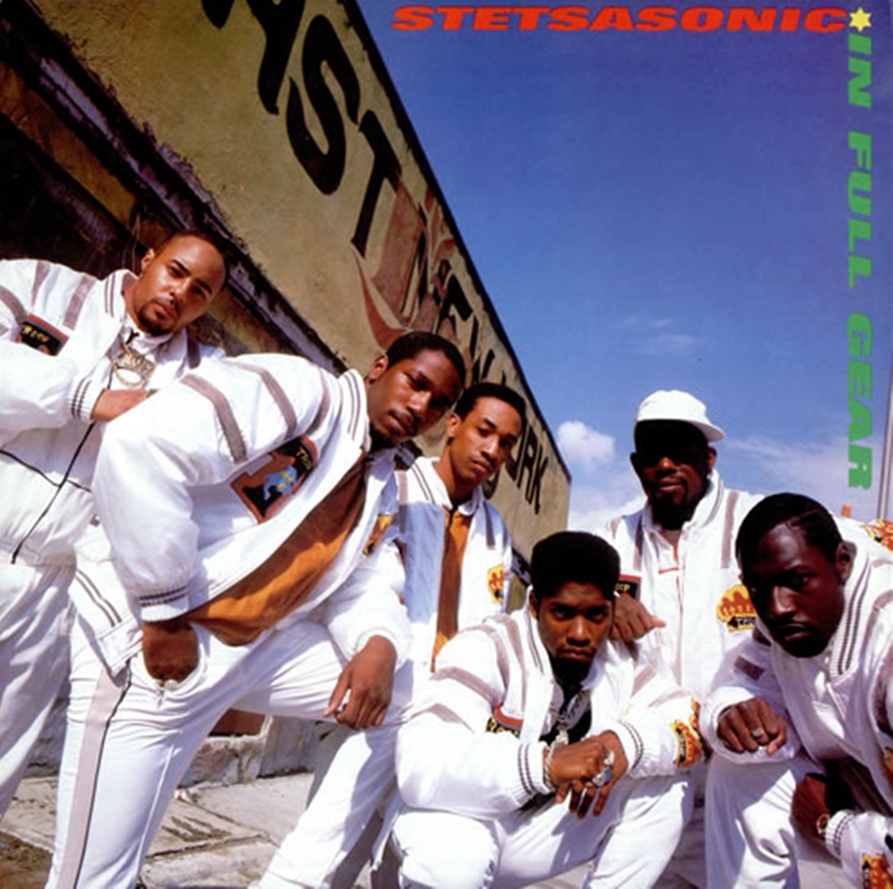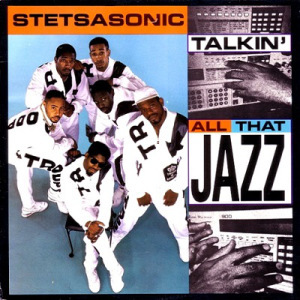In 1988 the rap group Stetsasonic recorded and released “Talkin’ All That Jazz” (video above). The song was a response to criticism that hip hop sampling was lazy and uncreative. I’ve documented the story behind the song below but first let me break down some of the song’s lyrics.
Lyrics
[Intro]
Of course we expect to win.
Any self respecting intellegent person knows that this so called band, Stesaonic, and the rest of this hip hop music is just a passing fad.
Which one, is not create
Two, inspires violence and
Three encouraged thievery in the form of sampling
No further questions please
This intro illustrates the general attitude at the time that hip hop represented a violent and criminal criminal behavior, that it was a lazy non creative practice. It is hard to imagine that mindset today, years after hip hop has achieved global sucess, but in the late 90s this view was quite widespread.
[Verse 1]
Well here’s how it started, heard you on the radio
Talking ’bout rap, saying all that crap
About how we sample, giving examples
Think we’ll let you get away with that?
You criticize our method of how we make records
You said it wasn’t art, so now we’re gonna rip you apart
Stop, check it out my man
This is the music of a hip-hop band
Jazz, well you can call it that
But this jazz retains a new format
Point, where you misjudged us
Speculated, created a fuss
You’ve made the same mistake politicians have
Talkin’ all that jazz
The song opens with a reference to Stestasonic member Daddy-o who heard jazz musican Mtume belittling hip hop on New York radio calling it lazy and uncreative (read more about the story below). The verse continues by defending the art of hip hop sampling as a type of jazz in a new format.
[Verse 2]
Talk, well I heard talk is cheap
But like beauty, talk is just skin deep
And when you lie and you talk a lot
People tell you to step off a lot
You see, you misunderstood, a sample’s just a tactic
A portion of my method, a tool, in fact it’s
Only of importance when I make it a priority
And what we sample’s loved by the majority
But you a minority in terms of thought
Narrow minded and poorly taught
About hip-hop, playing all the silly games
To erase my music so no one can use it
You step on us and we’ll step on you
Can’t have your cake and eat it too
Talkin’ all that jazz
In the second verse Stetsasonic points out that a sample is just a tool, a building block, for a larger something larger. This verse also notes the way that copyright ends up being a form of de facto censorship, “to erase my music so no one can use it”.
[Verse 3]
Lies, that’s when you hide the truth
It’s when you talk more jazz than proof
And when you lie and address something you don’t know
It’s so wack that it’s bound to show
When you lie about me or the band we get angry
Whip out our pen, start writing again
And the things we write are always true
Sucker, get a grip, now we talking ’bout you
Seems to me that you have a problem
So we can see what we can do to solve them
Think rap is a fad? You must be mad
Cause we’re so bad we get respect you never had
Tell the truth, James Brown was old
‘Til Eric and Ra came out with “I Got Soul”
Rap brings back old R&B
And if we would not, people could’ve forgot
We wanna make this perfectly clear
We’re talented and strong and have no fear
Of those who choose to judge but lack pizazz
Talkin’ all that jazz
The third verse makes the point that hip hop sampling breaths new life into older music,”… James Brown was old ’til Eric and Ra came out with I Got Soul”. More importantly hip hop sampling helps preserve the history of music that might otherwise have been forgotten.
[Verse 4]
Now we’re not trying to be a boss to you
We just wanna get across to you
That if you’re talking jazz, the situation is a no-win
You might even get hurt, my friend
Stetsasonic, the hip-hop band
And like Sly and the Family Stone, we will stand
Up for the music we live and play
And for the song we sing today
For now, let us set the record straight
And later on we’ll have a forum and a formal debate
But it’s important you remember though
What you reap is what you sow
Talkin’ all that jazz
The last verse simply summarizes Stetsasonic’s defense of the integrity of the their music.
Mtume Disses Sampling
 The story behind Talkin’ All That Jazz starts with a musician James Mtume. Born in 1946 in Philidelphia James came from a jazz family, he played with Miles Davis, and recorded the song “Juicey Fruit“[music video] in 1983 with his band Mtume. Here’s a great written profile of James Mtume with an great audio segment. Today the song Juicy Fruit is most well known as the foundation for a song by The Notorious B.I.G called Juicy (1994)[music video].
The story behind Talkin’ All That Jazz starts with a musician James Mtume. Born in 1946 in Philidelphia James came from a jazz family, he played with Miles Davis, and recorded the song “Juicey Fruit“[music video] in 1983 with his band Mtume. Here’s a great written profile of James Mtume with an great audio segment. Today the song Juicy Fruit is most well known as the foundation for a song by The Notorious B.I.G called Juicy (1994)[music video].
As an aside the Juicy Fruit lyric “I’ll be your lollipop [You can lick me everywhere]” (listen) was censored and replaced by “I’ll be your lollipop [Candy kisses everywhere]” (listen) for the music video. Additionally Mtume’s label withheld the rights to Juicy Fruit from daytime radio, only releasing it for nighttime play (listen @ 1:35). These two points just serve to illustrate yet again how black music has been censored lyrically, and how copyright law can be used as tool of censorship and control.
In any case Mtume was not a fan of sampling. He charged that “this is the first generation of African Americans not be extending the range of music” and that the resulting recordings “were nothing but Memorex music”. Mtume made a bold analogy, that “sampling James Brown’s drum beats in a hip hop album was like me sticking chapters from James Baldwin in my books and claiming the words as mine” [1]. Mtume went on Bob Slade’s The Week In Review on NYC’s KISS-FM and shared his opinion of ‘lazy’ Hip-Hop producers that never learned to play instruments, opting instead to take up ‘sampling’. Describing them as the “Glorification of mediocrity“ [2].
Watch Mtume discuss these issues more here and here. Or browse the 76+ songs that sampled Mtume’s Juicy Fruit.
Making Talkin’ All that Jazz (Prince Paul)
Prince Paul is an original member of Stetsasonic and famous hip hop producer, primarily for his production of De La Soul’s first three albums. He recounts the story behind All That Jazz in his own words below…
 “That was inspired when Daddy-O and MC Delite were listening to Mtume, who made ‘Juicy Fruit,’ which in turn was used for the Biggie record. [Mtume] was kind of disrespecting hip-hop. I might stand corrected on this, but he was dissing hip-hop saying that it’s not original and it’s not really an art form. It kind of ticked Daddy-O off, and he came up with this idea responding to that situation.
“That was inspired when Daddy-O and MC Delite were listening to Mtume, who made ‘Juicy Fruit,’ which in turn was used for the Biggie record. [Mtume] was kind of disrespecting hip-hop. I might stand corrected on this, but he was dissing hip-hop saying that it’s not original and it’s not really an art form. It kind of ticked Daddy-O off, and he came up with this idea responding to that situation.
Sampling back then was kind of like a gray area. It was a new art form and people were just starting to get creative with it. Anybody who was outside of hip-hop really did not want to have anything dealing with sampling, or any type of urban hip-hop culture.
People these days don’t realize that it was an ongoing battle. Now, even pop artists sample, but back then it was like, ‘What? You do what?’ They’d just say, ‘You’re not original!’ And they’d just diss it. It’s something that a lot of guys from my era don’t really talk about, but it existed, and it was a fight.
Back then we just did it. Laws later dictated what were the repercussions. Since it was in a gray area there really wasn’t a guideline. It wasn’t like, ‘Don’t do this, or don’t do that.’ You just got as creative as you possibly could, and people just didn’t know. It wasn’t until a few lawsuits down the line, and they tried to make a guideline on how to sample, what costs you, what’s the legal amount of time to sample, etc. [*the current legal amount of time to sample is zero]
When all these dudes are complaining about, ‘Man, hip-hop ain’t real like back in the golden age,’ they’re probably the ones affecting that. Now you’re going to either get a keyboard, or a loop that’s really chopped up, synthesized, twisted, and you’re not going to get a lot of what that music offers.
It still hasn’t been resolved, and nobody really knows. It varies from case to case. And that’s basically what it was. You just did it, and then randomly years later you go, ‘I got sued for what?’ [Laughs.] It’s crazy, and it definitely affects how you make records nowadays.
It’s not really friendly to sample stuff. If you’re going to sample, and really want to get busy, you have to get that out for free. If you put it out, you have all these guys online that are like, ‘I’m going to expose all these producers. And I’m going to tell-a-tale on every loop they used.’ Yeah, they know something other people might not know that’s cool, but they’re also affecting the way music is getting made. Because now hip-hop producers like myself are going to say, ‘I’m going to stay away from sampling.’
So when all these dudes are complaining about, ‘Man, hip-hop ain’t real like back in the golden age,’ they’re probably the ones affecting that. Now you’re going to either get a keyboard, or a loop that’s really chopped up, synthesized, twisted, and you’re not going to get a lot of what that music offers.
In regards to the essence of sampling, I would say whatever the song dictates it to be. I can’t say Alchemist and Premier are right for the way they flip stuff, and what Puffy did were wrong. Now money helps. Man, if I had Puffy’s budget, I’ll be taking straight out flat songs, too. I’ll be like, ‘Yeah! Clear it! How much they want? Yeah, whatever. Song sounds right. Take that! Let’s make it happen.’
Money helps. Man, if I had Puffy’s budget, I’ll be taking straight out flat songs, too. I’ll be like, ‘Yeah! Clear it! How much they want? Yeah, whatever. Song sounds right. Take that!’
But if you’re dealing with the label, and they go, ‘Okay, we have $50,000 to make the song.’ And somebody says the sample you want to use is $49,000; you have to get extra creative. You might have a loop that you don’t want to chop it or do anything, but now you’re stuck with these crazy costs. So money definitely affects how you create.
If I have a crazy budget to use whatever sample, and do whatever I want to do? I’ll have the most insane record coming out next year for anybody. I would quote this and say I’ll blow anybody out the box if I have free range to sample and do stuff. I can pay different keyboard players, but money dictates how to be creative or how your music is presented. Look at EPMD in the early days. They were using nothing but loops. So it’s really hard to say. You know?”
Making Talkin’ All that Jazz (Daddy-O)
Daddy-O is also an original member of Stetsasonic. He recounts the story behind All That Jazz in his own words below…
 “Now, there’s a radio show in New York called The Week In Review with Bob Slade which is still on today. It’s a very, very informative show where they highlight certain things and talk about different issues. So what happened was, James Mtume was a guest on the radio show and he was talking about how Hip-Hop was creating this generation of uncreative musicians through sampling. He’s saying how it’s making people lazy and how the people who’re sampling don’t know how to play instruments or really know anything about music, blah, blah, blah. Now, I wasn’t able to be a guest on that particular show, but then Bob Slade brought me up on another show and I was able to talk about sampling from our perspective. So it kinda kept going back and forth between me and Mtume, but not directly. -Daddy-O
“Now, there’s a radio show in New York called The Week In Review with Bob Slade which is still on today. It’s a very, very informative show where they highlight certain things and talk about different issues. So what happened was, James Mtume was a guest on the radio show and he was talking about how Hip-Hop was creating this generation of uncreative musicians through sampling. He’s saying how it’s making people lazy and how the people who’re sampling don’t know how to play instruments or really know anything about music, blah, blah, blah. Now, I wasn’t able to be a guest on that particular show, but then Bob Slade brought me up on another show and I was able to talk about sampling from our perspective. So it kinda kept going back and forth between me and Mtume, but not directly. -Daddy-O
Now, Delite had already come up with the idea of doing a record called “Talkin’ All That Jazz”, but his idea was to do something similar to what Guru and Premier did later with “Jazz Music” and “Jazz Thing”. Delite wanted to do a record like that, really showing the similarities between Hip-Hop and jazz
We also wanted to show how, not being disrespectful, but in the same way that people thought Kenny G and Najee was real jazz, we felt the same thing was going to happen with Hip-Hop and that our own Coltranes and all of that would be pushed to the side if we weren’t being mindful. So that was originally what we wanted to do with “Talkin’ All That Jazz” and Delite had also come up with the idea of using the Lonnie Liston Smith “Expansions” sample.
Then Tom Silverman at Tommy Boy had to get me on the phone with Lonnie Liston Smith for the rights to use his record [“Expansions”]. I remember I got on the phone and Lonnie said to me, ‘Young blood, you can have that, man. That ain’t “Expansions” no more, you done made something new. … I couldn’t believe he was saying that to me. I remember him saying how he was proud of us for taking his music and making something new out of it.”
“Sampling’s not a lazy man’s way. We learn a lot from sampling, it’s like school for us. When we sample a portion of a song and repeat it over and over we can better understand the matrix of the song.”
—Daddy-O of Stetsasonic, cited in Black Noise by Tricia Rose, Wesleyan Press 1994, p. 79
Making Talkin’ All that Jazz (Fab 5 Freddy)
Fab 5 Freddy was the director of the All That Jazz video. He talks about the video and song below…
I like how Fab 5 Freddy talks about the sampling machine prop that he designed for the video, keeping in mind that this video was released the same year that the first Akai MPC was introduced.
Footnotes & Links
[1] After DADDY ‘O heard a radio interview with Jazz musician JAMES ‘MTUME’ on Bob Slades – The Week In Review show where Mtume pronounced “Sampling should be a tool for creativity, not a substitute for it” the Stetsasonic front man took the strong words as inspiration and hit the studio alongside Prince Paul’s keyboardist DON NEWKIRK ( he can be heard voicing the intro of 3rd Bass – The GasFace ). Don played a bassline based around Lonnie Liston Smith’s ‘Expansions’ whilst the Stetsa crew took many a shot at Mtumes opinion of ‘lazy’ Hip-Hop producers that never learned to play instruments, opting instead to take up ‘sampling’. Mtume describing them at the time as the “Glorification of mediocrity“.
-Fresh Wild Fly & Bold
[2] The funk artist Mtume attacked sampling for these very reasons during the 1980s. He referred to it as “Memorex music,” invoking both the cassette tape brand and also the specter of a lazy new generation of artists who simply hit the record button to make their music. This criticism from Mtume and other older artists prompted the hip-hop group Stetsasonic to pen a reply in the form of their 1988 hit “Talkin’ All that Jazz.” (*74 . George, Hip-Hop America, 89.)
-Creative License
–Daddy-O Bio (2)
–Talkin’ All That Jazz lyrics via RapGenius
–Talkin’ All that Jazz samples at least 7 songs
*Fab 5 Freddy rapped on Blondie’s Rapture